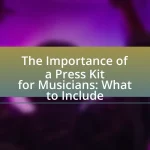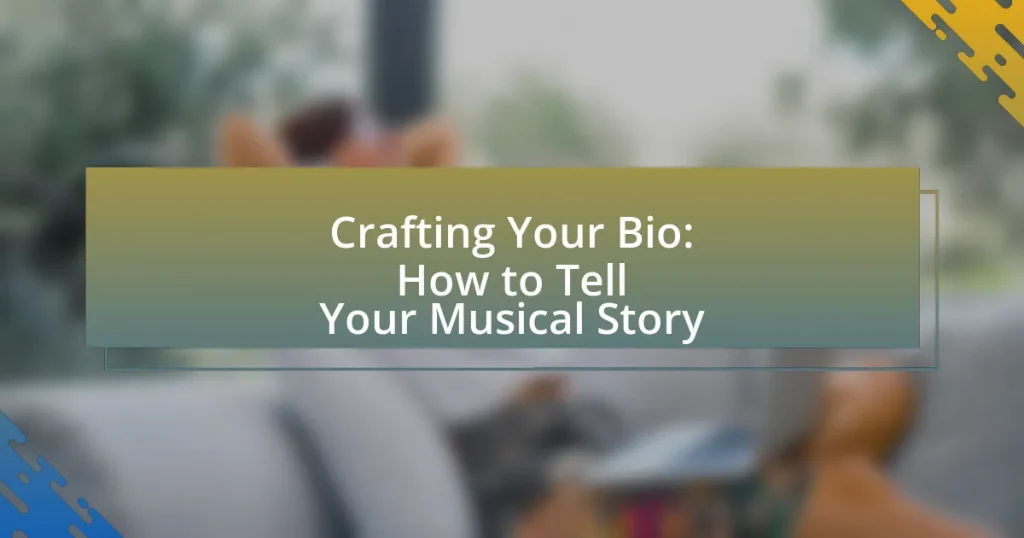Crafting a musical bio is essential for artists as it encapsulates their journey, achievements, and unique style, serving as a vital marketing tool. This article outlines the importance of a well-structured bio, detailing key elements such as background, notable performances, and personal experiences that shape an artist’s narrative. It emphasizes the role of storytelling in engaging audiences and provides best practices for creating an impactful bio, including avoiding common pitfalls and maintaining relevance through regular updates. Additionally, the article highlights how visuals can enhance a bio and the significance of feedback in refining musical storytelling.

What is Crafting Your Bio in Music?
Crafting your bio in music is the process of creating a concise and engaging narrative that highlights an artist’s musical journey, achievements, and unique style. This bio serves as a critical tool for marketing and connecting with audiences, as it encapsulates the essence of the artist’s identity and influences. A well-crafted bio typically includes key elements such as the artist’s background, notable performances, collaborations, and any awards or recognitions received, which collectively establish credibility and appeal.
Why is a musical bio important for artists?
A musical bio is important for artists because it serves as a concise representation of their identity, achievements, and artistic vision. This document helps artists communicate their story to potential fans, industry professionals, and media outlets, establishing credibility and fostering connections. For instance, a well-crafted bio can highlight significant milestones, such as album releases or notable performances, which can enhance an artist’s visibility and appeal. Additionally, research indicates that 70% of music industry professionals consider an artist’s bio essential when evaluating new talent, underscoring its role in career advancement.
How does a bio impact an artist’s career?
A bio significantly impacts an artist’s career by shaping their public image and establishing credibility. A well-crafted bio communicates an artist’s background, achievements, and unique style, which can attract fans, industry professionals, and media attention. For instance, a bio that highlights notable performances or collaborations can enhance an artist’s reputation and open doors to new opportunities, such as gigs or record deals. Research indicates that artists with compelling bios are more likely to be featured in music publications and playlists, thereby increasing their visibility and potential for success in a competitive market.
What role does storytelling play in a musical bio?
Storytelling in a musical bio serves to create a compelling narrative that engages the audience and conveys the artist’s journey, influences, and identity. This narrative structure allows listeners to connect emotionally with the artist, making their music more relatable and impactful. For instance, a well-crafted bio can highlight pivotal moments, such as struggles or triumphs, which resonate with fans and provide context for the artist’s work. Research indicates that narratives enhance memory retention and emotional engagement, making storytelling an essential tool for artists to effectively communicate their unique experiences and artistic vision.
What elements should be included in a musical bio?
A musical bio should include the artist’s background, musical influences, notable achievements, discography, and current projects. The background provides context about the artist’s origins and journey in music, while musical influences highlight the styles and artists that shaped their sound. Notable achievements, such as awards or significant performances, establish credibility and recognition in the industry. The discography lists released works, showcasing the artist’s evolution and contributions to music. Current projects inform readers about ongoing work, keeping the bio relevant and engaging.
How do personal experiences shape your musical narrative?
Personal experiences significantly shape musical narratives by providing authentic emotional content and relatable themes. Musicians often draw from their life events, such as relationships, struggles, and triumphs, to create lyrics and melodies that resonate with listeners. For instance, Taylor Swift’s songwriting frequently reflects her personal relationships and experiences, allowing her audience to connect deeply with her music. This connection is supported by research indicating that autobiographical elements in music enhance listener engagement and emotional response, as seen in studies published in the Journal of Music Psychology. Thus, personal experiences serve as a foundation for crafting compelling musical stories that engage and inspire audiences.
What achievements should be highlighted in your bio?
Key achievements to highlight in your bio include notable performances, awards, and collaborations. For instance, mentioning performances at prestigious venues or festivals demonstrates your experience and recognition in the music industry. Awards, such as Grammy nominations or wins, provide concrete evidence of your talent and impact. Collaborations with well-known artists or producers can showcase your versatility and ability to work within the industry. These elements collectively establish credibility and attract interest from potential listeners and industry professionals.

How to Structure Your Musical Bio Effectively?
To structure your musical bio effectively, begin with a compelling introduction that highlights your musical identity, including your genre and unique style. Follow this with a chronological overview of your musical journey, detailing significant milestones such as album releases, performances, and collaborations. Include notable achievements, such as awards or recognitions, to establish credibility. Finally, conclude with a personal touch, sharing your artistic vision or future aspirations, which helps to connect with your audience on a deeper level. This structure not only presents your story clearly but also engages readers by showcasing your passion and dedication to music.
What is the ideal format for a musical bio?
The ideal format for a musical bio includes a clear structure that typically consists of an engaging introduction, a detailed career overview, notable achievements, and personal insights. This format allows readers to quickly grasp the artist’s background, musical style, and significant milestones. For instance, starting with a captivating hook can draw in the audience, followed by a chronological account of the artist’s journey, highlighting key performances, awards, and collaborations. Including personal anecdotes or influences adds depth and relatability, making the bio more engaging. This structured approach is effective because it provides a comprehensive yet concise narrative that resonates with fans, industry professionals, and media outlets.
How should you organize your bio for maximum impact?
To organize your bio for maximum impact, start with a compelling opening statement that captures your unique musical identity. This should be followed by a concise overview of your musical journey, highlighting key achievements, influences, and experiences that define your artistry. Incorporate specific details such as notable performances, collaborations, or awards to substantiate your claims and engage the reader. Finally, conclude with a call to action or a personal touch that invites further connection, ensuring that your bio resonates emotionally while remaining informative.
What tone and style should you use in your bio?
The tone and style you should use in your bio should be authentic and engaging, reflecting your unique personality and musical journey. An authentic tone fosters a genuine connection with your audience, while an engaging style captures their interest. For example, using conversational language can make your bio relatable, and incorporating specific anecdotes about your musical experiences can enhance engagement. Research indicates that personal storytelling in bios increases audience connection, as highlighted in studies on narrative psychology.
How can you make your bio stand out?
To make your bio stand out, focus on showcasing your unique musical journey and achievements. Highlight specific milestones, such as notable performances, collaborations, or awards, to create a compelling narrative. For instance, mentioning that you performed at a major festival or collaborated with a well-known artist adds credibility and interest. Additionally, using vivid language and a personal touch can engage readers, making your story relatable and memorable. Statistics show that bios with personal anecdotes and specific accomplishments are more likely to resonate with audiences, enhancing your visibility in a competitive industry.
What unique aspects of your journey should you emphasize?
Emphasize your distinctive musical influences and experiences that shaped your artistry. Highlight specific genres or cultural elements that have inspired your work, such as a unique blend of traditional and contemporary styles. For instance, if you grew up in a multicultural environment, mention how that diversity has enriched your sound and songwriting. Additionally, showcase any significant milestones, like collaborations with renowned artists or performances at notable venues, which demonstrate your growth and recognition in the music industry. These elements not only differentiate your journey but also provide a compelling narrative that resonates with audiences and industry professionals.
How can visuals enhance your musical bio?
Visuals can enhance your musical bio by providing a compelling representation of your artistic identity and engaging your audience more effectively. High-quality images, videos, and graphics can convey emotions and themes associated with your music, making your bio more memorable. For instance, research indicates that visuals increase information retention by up to 65%, which underscores their importance in storytelling. Additionally, visuals can showcase your performances, album covers, and behind-the-scenes moments, creating a richer narrative that resonates with fans and industry professionals alike.

What Common Mistakes Should You Avoid in Your Musical Bio?
Common mistakes to avoid in your musical bio include being overly vague, using jargon, and neglecting to highlight unique achievements. Vague descriptions fail to convey your identity and musical style, making it difficult for readers to connect with you. Using jargon can alienate potential fans who may not understand industry-specific terms. Additionally, neglecting to showcase unique achievements, such as awards or notable performances, diminishes your credibility and appeal. These elements are crucial for creating a compelling narrative that resonates with your audience and effectively communicates your musical journey.
What pitfalls do musicians often encounter when writing their bios?
Musicians often encounter the pitfall of being overly vague or generic when writing their bios. This lack of specificity can lead to a failure to engage the audience, as bios that do not highlight unique experiences or distinctive qualities do not effectively convey the musician’s identity. Additionally, musicians may struggle with self-promotion, feeling uncomfortable about showcasing their achievements or skills, which can result in a bio that downplays their accomplishments. Furthermore, many musicians neglect to tailor their bios to their target audience, missing the opportunity to connect with fans or industry professionals who seek relatable and relevant information. These pitfalls can diminish the impact of a musician’s bio, making it less memorable and less effective in establishing their brand.
How can vague language detract from your bio’s effectiveness?
Vague language detracts from your bio’s effectiveness by obscuring your unique identity and achievements. When a bio lacks specificity, it fails to convey clear information about your skills, experiences, and musical style, making it difficult for audiences to connect with you. Research shows that specific details in bios can increase engagement; for instance, a study by the Content Marketing Institute found that 70% of consumers prefer brands that provide personalized content. Therefore, using precise language enhances clarity and helps establish a stronger connection with your audience.
Why is it important to avoid clichés in your musical story?
Avoiding clichés in your musical story is crucial because they dilute originality and fail to engage listeners. When musicians rely on overused phrases or themes, they risk making their narratives predictable and unmemorable. Research indicates that unique storytelling enhances emotional connection; for instance, a study published in the Journal of Consumer Research found that original narratives lead to greater audience engagement and retention. Therefore, crafting a distinctive musical story not only captures attention but also fosters a deeper connection with the audience.
How can you keep your bio updated?
To keep your bio updated, regularly review and revise it to reflect your latest achievements, experiences, and skills. This practice ensures that your bio accurately represents your current status and aligns with your evolving career in music. For instance, if you release new music, collaborate with other artists, or receive awards, incorporate these updates promptly. Regularly updating your bio not only maintains its relevance but also enhances your professional image, as a well-maintained bio can attract new opportunities and audiences.
What triggers should prompt a bio revision?
A bio revision should be prompted by significant changes in an individual’s career, such as new achievements, collaborations, or shifts in artistic direction. For instance, if an artist releases a new album, wins an award, or changes their musical style, these milestones warrant an update to accurately reflect their current status and narrative. Additionally, if there are changes in personal circumstances, such as relocation or a name change, these should also trigger a revision to ensure the bio remains relevant and accurate.
How often should you review and update your musical bio?
You should review and update your musical bio at least once every six months. Regular updates ensure that your bio reflects your current achievements, style, and projects, which is crucial for maintaining relevance in the music industry. Additionally, significant changes such as new releases, collaborations, or awards should prompt an immediate update to keep your bio accurate and engaging.
What are some best practices for crafting your musical bio?
To craft an effective musical bio, focus on clarity, authenticity, and engagement. Start with a compelling opening that highlights your unique musical identity, including your genre, influences, and key achievements. Use concise language to convey your story, ensuring it reflects your personality and artistic vision. Incorporate specific details such as notable performances, collaborations, or awards to establish credibility and connect with your audience. Additionally, maintain a professional tone while allowing your individuality to shine through, as this balance can attract both fans and industry professionals.
How can feedback from peers improve your bio?
Feedback from peers can significantly enhance your bio by providing diverse perspectives and constructive criticism. Peers can identify strengths and weaknesses in your narrative, ensuring clarity and engagement. For instance, they may suggest more impactful language or highlight unique experiences that resonate with audiences. Research indicates that collaborative feedback improves content quality, as seen in studies on peer review processes in writing, which show that multiple viewpoints lead to more polished and effective communication.
What resources can help you refine your musical storytelling?
Books on songwriting, such as “The Complete Singer-Songwriter” by Jeffrey Pepper Rodgers, can help refine musical storytelling by providing techniques and insights into narrative structure and emotional connection. Additionally, online courses like those offered by Berklee Online focus on songwriting and storytelling, teaching practical skills and concepts that enhance narrative depth in music. Workshops and seminars led by experienced songwriters also serve as valuable resources, allowing for real-time feedback and collaborative learning, which can significantly improve one’s ability to convey stories through music.















